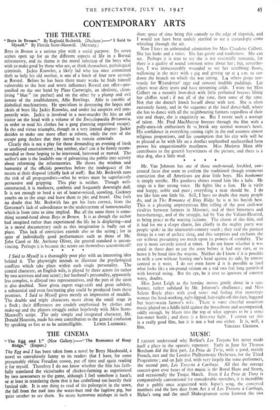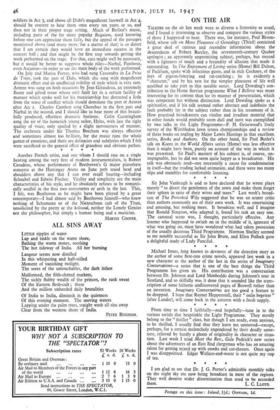MUSIC
I CANNOT understand why Berlioz's Les Troyens has never made itself a place in the operatic repertory. Early in June Sir Thomas Beecham did the first part, La Prise de Tr"ie, with a good, mainly French, cast and the London Philharmonic Orchestra, for the Third Programme ; and on July znd, with very largely the same performers, the second part, Les Troyens a Carthage. All that the average concert-goer ever hears of this music is the Royal Hunt and Storm, and occasionally the Trojan March. Even if La Prise de Troie is comparatively conventional for considerable stretches, it is incredible that a public once acquainted with lopas's song, the concerted numbers and the love duet from Act 2 of Les Troyens a Carthage, Hylas's song and the small Shakespearean scene between the two soldiers in Act 3, and above all Dido's magnificent farewell in Act 4, should be content to hear them once every ten years or so, and then not in their proper stage setting. Much of Berlioz's music, including parts of the far more popular Requiem, need knowing before one can appreciate them fully, but the appeal of the passages mentioned above (and many more;for a matter of that) is so direct that I am certain they would have an immediate success in the concert hall ; and that might be the first step towards getting the work performed on the stage. For that, cuts might well be necessary, but it would be better to suppress whole roles—Narbal, Pantheus, even Ascanius—in order to see the main body of the work performed.
On July and Marisa Ferrer, who had sung Cassandra in La Prise de Troie, took the part of Dido, which she sang with magnificent dramatic effect and an unaffected nobility of style which is very rare. Aeneas was sung on both occasions by Jean Giraudeau, an extremely fluent and gifted tenor whose only fault lay in a certain facility of manner which spoke well for his musicianship but detracted a little from the sense of conflict which should dominate the part of Aeneas after Act r. Charles Cambon sang Chorebus in the first part and Narbal in the second, and I should like to hear more of this beauti- fully produced, effortless dramatic baritone. Cohn Cunningham sang the air of the homesick young sailor, Hylas, with just the right quality of voice, only spoiled by a slight nervousness of manner. The orchestra under Sir Thomas Beecham was always effective and sometimes almost too brilliant, for the music runs the whole gamut of emotions, and there are delicacies and subtleties which I felt were sacrificed to the general effect of grandeur and obvious pathos.
* * * * Another French artist, and one whom I should rate on a single hearing among the very first of modern instrumentalists, is Robert Casadeus, whose performance of Beethoven's G major pianoforte concerto at the Harringay Arena on June 3oth stood head and shoulders above any that I can ever recall hearing—including Schnabel and Edwin Fischer. Vitality and simplicity are the main characteristics of his style, and he absolutely refuses to be romanti- cally soulful in the first two movements or arch in the last. This,
I felt, was Beethoven as he might have been played by a great contemporary—I had almost said by Beethoven himself—who knew nothing of Schumann or of the Nietzschean cult of the Titan, unsolicited by the pretty or the kolossal, neither the Lonely Genius nor the philosopher, but simply a human being and a musician.
MARTIN COOPER.



































 Previous page
Previous page